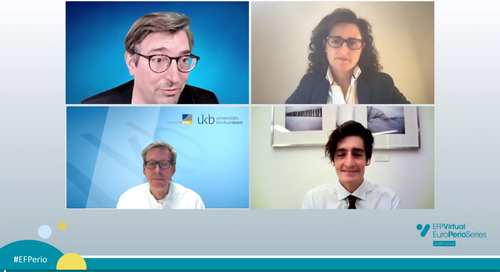![]()
21 October 2021
Second EuroPerio Series session explored orthodontic treatment in patients with stage IV periodontitis
Categories:Clinical Practice, Communication, New Classification

The second of seven EuroPerio Series online educational sessions took place on 11 October, with an expert focus on the issues involved in providing orthodontic treatment to patients with stage IV periodontitis.
Chaired by Moritz Kebschull (professor of restorative dentistry at the University of Birmingham in the UK and an elected member of the EFP executive committee), the session offered different perspectives on the challenges involved in treating these patients.
Introducing the session, Prof Kebschull noted that under the staging and grading approach of the new classification adopted at the 2017 World Workshop on periodontal and peri-implant diseases and conditions, only stages I, II, and III – mild, moderate, and severe periodontitis – are predominantly defined by periodontitis per se, while stage IV is a “different animal” that is defined by prosthetic, orthodontic, or occlusion factors.
He mentioned the forthcoming Perio Workshop 2021 (November 7-9), which will start to draw up a clinical practice guideline on treatment of stage IV periodontitis to complement the existing EFP guideline on periodontitis stages I-III.
The session covered problems such as pathological tooth movement, secondary occlusal trauma, and the issues involved in restoring patients with these problems.
Elena Figuero (associate professor of periodontology, Complutense University of Madrid, Spain) spoke about how to plan and implement treatment from the periodontist’s point of view. She addressed three questions: (1) as a periodontist, how do I know that a patient requires orthodontic treatment? (2) which periodontal therapy should be performed in stage-IV periodontitis cases? (3) Can orthodontic therapy be safely performed in these patients?
In discussing the last of these questions, she referred to a systematic review with meta-analysis (of which she is a co-author) that is one of the papers that will be considered at Perio Workshop 2021. This review concluded that the existing evidence on the orthodontic treatment of patients with severe periodontitis is “limited and of poor quality.” While orthodontic therapy can be performed safely in stable treated periodontitis patients, it is not yet clear what is the optimal treatment protocol in terms of timing between orthodontic and periodontal therapies.
Spyridon N. Papageorgiou (faculty member at the Clinic of Orthodontics and Paediatric Dentistry, Centre of Dental Medicine of the University of Zurich in Switzerland) then explained how to plan and implement treatment from the perspective of the orthodontist. He focused on treating the symptoms of bite collapse, drifting, and flaring of teeth.
He noted how combined perio-ortho treatments showed improvements in clinical attachment levels, periodontal probing depth (PPD), and sites with PPD. He also highlighted that the usual side-effects of orthodontic treatment were slight marginal bone loss and slight root resorption.
Dr Papageorgiou’s take-home messages included: orthodontic therapy in stage-IV periodontitis patients is possible, it does not seem to negatively affect periodontal conditions (and maybe affects them positively), there should be an initial anti-infective periodontal treatment, the orthodontic appliances need to be properly selected, and orthodontic therapy needs to be adapted to the biomechanics of attachment loss.
The third speaker was Søren Jepsen (chair of the department of periodontology, operative, and preventive dentistry at University Medical Centre, Bonn, Germany and a former EFP president), who addressed periodontal regeneration and orthodontic treatment.
Prof Jepsen highlighted a clinical case with localised stage-IV periodontitis, with an elongated tooth with an intrabony defect reaching the apical third of the root and the questions which it raised: (1) maintain the tooth and treat it or extract it and replace with an implant or a bridge? (2) if it is to be maintained and treated, what type of periodontal therapy would be needed? (3) what should be the timing of the orthodontic treatment?
Looking ahead to EuroPerio10
All four participants in this EuroPerio Series sessions will be speaking at the EuroPerio10 congress, which takes place in Copenhagen on June 15-18.
Moritz Kebschull will chair the session Understanding the host response to periodontitis: bases for host-based diagnosis and host modulation theory (Friday, June 17) in which he will also speak on the bases for diagnosis using metagenomic approaches.
Elena Figuero will speak on chemical biofilm control (Friday, June 17), Spyridon N. Papageorgiou will talk about orthodontics in patients with periodontitis (Thursday, June 16), and Søren Jepsen will chair the session Critical factors in surgical design for the treatment of furcation defects.
Access to the EuroPerio Series sessions – for both live and on-demand viewing – is free for people who have already registered and paid for the EuroPerio10 congress, which takes place in Copenhagen from June 15 to 18, 2022.
Registration for each individual session of the EuroPerio Series costs €35. Registration for all sessions costs €195 (a 20% discount on booking for individual sessions). Registration fees include 25% VAT. The registration fee includes participation in the virtual scientific programme, a certificate of attendance, and on-demand access to the recordings.
The EuroPerio Series sessions take place on the second or third Monday of every month, from 18:00 to 20:00 (CET). The topic of the third session, on November 15, will be Periodontal diseases and systemic diseases. Can we improve systemic health with periodontal therapy?
This session will be chaired by Phoebus Madianos, chair of the EuroPerio10 organising committee. Angela R. Kamer (USA) will talk about the impact of periodontal diseases on neurodegenerative conditions, Bjorn Klinge (Sweden) will focus on the impact on cardiovascular diseases, and Francesco d’Aiuto (UK) will discuss the impact on metabolic disorders.




